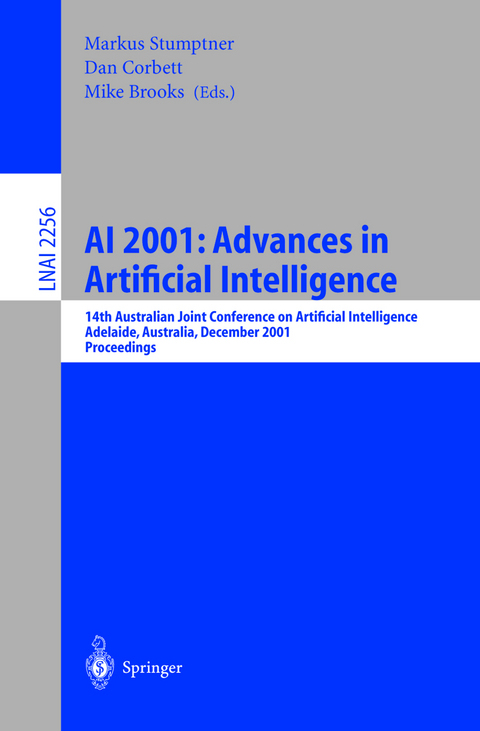
AI 2001: Advances in Artificial Intelligence
Springer Berlin (Verlag)
978-3-540-42960-9 (ISBN)
Papers.- A Memetic Pareto Evolutionary Approach to Artificial Neural Networks.- Relating Defeasible and Default Logic.- Resolving Minsky's Paradox : The d-Dimensional Normal Distribution Case.- Solving Overconstrained Temporal Reasoning Problems.- How the Level of Interchangeability Embedded in a Finite Constraint Satisfaction Problem Affects the Performance of Search.- Towards Learning Naive Physics by Visual Observation: Qualitative Spatial Representations.- Phased Array Sub-beam Optimisation.- Generation of Facial Expressions from Emotion Using a Fuzzy Rule Based System.- An Efficient Form Classification Method Using Partial Matching.- Gradient Descent Style Leveraging of Decision Trees and Stumps for Misclassification Cost Performance.- Postdiction Problems in Dynamic Logic.- A Method for Reasoning with Ontologies Represented as Conceptual Graphs.- Selection of Tasks and Delegation of Responsibility in a Multiagent System for Emergent Process Management.- State Minimization Re-visited.- Decidability of Quantifed Propositional Branching Time Logics.- Improved Techniques for an Iris Recognition System with High Performance.- An Investigation of an Adaptive Poker Player.- Acquiring Adaptation Knowledge for CBR with MIKAS.- A Real-Time Region-Based Motion Segmentation Using Adaptive Thresholding and K-Means Clustering.- Automatic Cell Classification in Human's Peripheral Blood Images Based on Morphological Image Processing.- Formal Concept Analysis for Domain-Specific Document Retrieval Systems.- Learner's self-assessment: a case study of SVM for information retrieval.- A Semiotic Model of Communication and Its Implications for the Digital City Development.- Simulations for Comparing Knowledge Acquisition and Machine Learning.- Application of Genetic Algorithms tothe Optimisation of Neural Network Configuration for Stock Market Forecasting.- Updating epistemic states.- Fast Text Classification Using Sequential Sampling Processes.- Agents in a Multi-cultural World: Towards Ontological Reconciliation.- Logical Foundations for Reasoning about Trust in Secure Digital Communication.- Phe-Q : A Pheromone Based Q-Learning.- Specification of Kansei Patterns in an Adaptive Perceptual Space.- Embodying the JACK Agent Architecture.- Towards an Ontology of Part-of.- Actions Made Explicit in BDI.- Wrapping Boosters against Noise.- Continuous Temporal Models.- Language and Commonsense Knowledge.- Simulation of Network Security with Collaboration among IDS Models.- Programming Spoken Dialogs Using Grammatical Inference.- Towards Genetic Programming for Texture Classification.- Using Design Information to Identify Structural Software Faults.- The Application of AI to Automatically Generated Animation.- Planning with Noisy Actions (Preliminary Report).- Getting the Job Done in a Hostile Environment.- Solving the Qualification Problem (In the Presence of the Frame Problem).- Dialogue Modelling for a Conversational Agent.- Candidate Elimination Criteria for Lazy Bayesian Rules.- Simplifying the Development of Intelligent Agents.- An Operational Semantics for a PRS-Like Agent Architecture.- A Model of Unconstrained Digit Recognition Based on Hypothesis Testing and Data Reconstruction.- Collecting Quality Data for Database Mining.- Further Pruning for Efficient Association Rule Discovery.- Pattern Discovery in Probabilistic Databases.- The Complexity of Logic Program Updates.- Reasoning with Multimedia Information Using Symbolic Projection.- Invited Contribution.- Confidence Relations as a Basis for Uncertainty Modeling, Plausible Reasoning, and Belief Revision.
| Erscheint lt. Verlag | 28.11.2001 |
|---|---|
| Reihe/Serie | Lecture Notes in Artificial Intelligence | Lecture Notes in Computer Science |
| Zusatzinfo | XII, 672 p. |
| Verlagsort | Berlin |
| Sprache | englisch |
| Maße | 155 x 235 mm |
| Gewicht | 943 g |
| Themenwelt | Informatik ► Software Entwicklung ► User Interfaces (HCI) |
| Informatik ► Theorie / Studium ► Künstliche Intelligenz / Robotik | |
| Schlagworte | Agents • Agent Technology • AI logics • Algorithmic Learning • classification • Decision Tree • Formal Reasoning • genetic programming • Hardcover, Softcover / Informatik, EDV/Informatik • HC/Informatik, EDV/Informatik • Image Processing • Intelligence • Intelligent Agents • Intelligent Information Processing • Knowledge Processing • Künstliche Intelligenz • machine learning • Natural Language Processing • Neural networks • Optimization • Systems • Uncertainty |
| ISBN-10 | 3-540-42960-3 / 3540429603 |
| ISBN-13 | 978-3-540-42960-9 / 9783540429609 |
| Zustand | Neuware |
| Haben Sie eine Frage zum Produkt? |
aus dem Bereich


